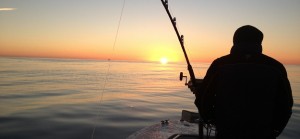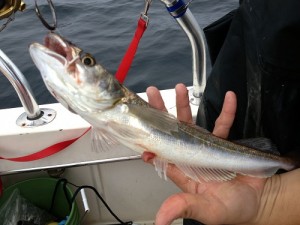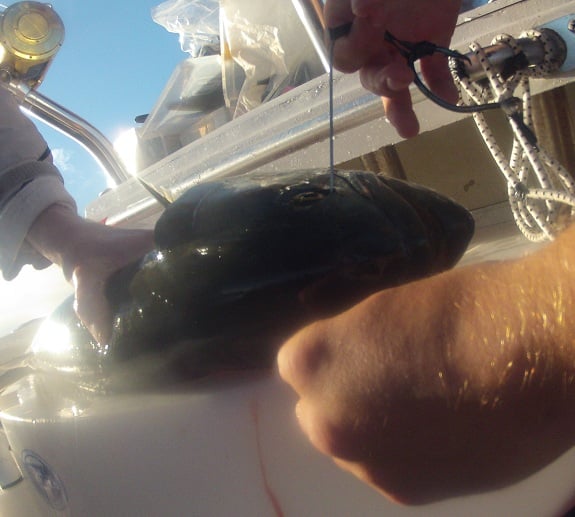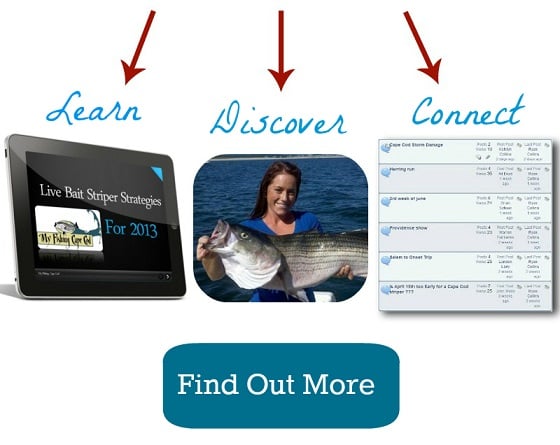Click here for the latest Cape Cod tuna fishing report
About 5 or 6 years ago my father, Mazzola and I bundled up and headed out to Stellwagen Bank during the first week in December. Thinking back it was a risky move - if something was to happen we would not last long in water. Without survival suits we would of lasted a few minutes at the most.

There also weren't many boats around to help us out if something was to happen. For the most part we were on our own. Yet it was a crystal clear and "warm" December day, so we decided to give Cape Cod tuna fishing a shot.
The bait was in thick and despite it being December we had a good feeling about the trip. We set out a couple of rigged ballyhoo's behind the boat and began trolling, when off in the distance I noticed what appeared to be machine gun fire pelting the surface of the ocean.
"Tuna!" I recall announcing to the crew.
I honestly couldn't believe what I was seeing. A few hundred yards away a school of tuna the size of a Little League baseball field was erupting on the surface. The fish smashed and tore through bait for a handful of seconds before disappearing again into the deep.
Moments later the starboard side Penn 80 began screaming under the strain of a strong bluefin. I looked back at the ballyhoo and saw nothing but whitewater. Here we were in December on Stellwagen Bank with a tuna on the line!
The drag was screaming as we shuffled around deck, preparing to settle in for the fight. Despite the 40 degree temperatures I began to sweat with excitement and anticipation. What a great story, and picture perfect end to an incredible fishing season this would be.
The fish was in the midst of making a long initial run when suddenly the line went slack. It took a few seconds for the heart wrenching reality to set in - the line had parted and the fish was gone forever.
That was our first experience with a December Cape Cod tuna and to be honest, it will probably be our last until we get a bigger boat.
Late November and early December is super late in the Cape Cod tuna fishing season. The water is getting cold and the fish are on the move. To be honest, for safety's sake I wouldn't really recommend heading out on the water. Yet if you have the boat and safety gear to do it, you may be rewarded by a late November/early December bite.
Granted of course the weather cooperates.
With Thanksgiving behind us, odds are your boat is now winterized and put away for the winter. If your boat is still in the water, then kudos to you! However truth be told the clock is ticking - especially if you are looking for a bluefin tuna.
Cape Cod Tuna Fishing | 3 Sure-Fire Tips for Your 1st Tuna
Losing that fish taught my father, Mazzola and I an important tuna fishing lesson:
Small details make a big difference
We had overlooked one small detail - our Finger trap/wind on connection - and it had cost us a big fish and an incredible fishing memory.
Losing that fish was pretty devastating. Actually, losing any fish can be pretty devastating. Over the years we have lost many tuna (arguably more than we have landed), including our first ever hookup which Mazzola lost at the boat after a 2 plus hour fight.
So with all this mind, and with some help from Mazzola, I've compiled the following 3 Sure-Fire tips for Your 1st Tuna.
The goal? To help you land the first Cap Cod bluefin tuna you hook up with and avoid tuna fishing heart break.
1. Match the hook size with the bait
Live bait fishing for tuna off Cape Cod is a popular method. Some of the most popular live baits include bluefish, whiting and mud hake to name just a few.
These baits come in a variety of different sizes. You may catch a few snapper bluefish under 10 inches and then hook an adult blue approaching 30 inches. Same goes for whiting and mud hake. All different sizes of live bait will work for tuna.

As the saying goes, "elephants eat peanuts!"
We've learned that it can pay to adjust hook size with the size of the bait. If you're using a big bluefish, then use a larger hook. If you have a bunch of 6 inch whiting in the tank, then switch to a smaller hook.
I like to think that a live bait looks and swims more naturally with an appropriate size hook. A small whiting is going to have a hard time kicking around in the water with a massive hook weighing down on the top of his head.
A big bluefish on the other hand needs a larger hook if you want to get a decent hook set when a giant swallows your bait.
So far Mazzola, my Dad and I have had decent success using the following types of hooks:
Super Mutu circle hooks by Owner for live bait fished under balloons
Jobu J Style hooks by Owner for fishing live baits under a kite
Offset Mustad hooks for chunking
In general we stick with 8/0 size hooks for most situations, but have gone with 10/0 for big bluefish and kite baits. It's possible to get away with larger hooks when using a kite because the hook is out of the water and not seen by passing tuna.
Depending on the application and size of bait, 7/0 to 11/0 size hooks should get the job done.
2. Black terminal tackle

To help catch line wary tunas, consider coloring all your terminal tackle black.
The last thing you want to do is work hard all day just to have a tuna shy away at the last moment because your shiny silver swivel spooks the fish. Who knows how many tuna shy away at the last second because of this - but you can help minimize the odds of that occurring by taking a few minutes to get rid of any shine.
To color tuna bombs we'll use black spray paint and to color terminal tackle such as swivels we'll use a permanent black marker. I'd recommend using black hooks and black rigging/bridling elastics as well.
Of course the spray paint and permanent marker most likely emit unfamiliar scents in the water, which segways nicely into the 3rd tip below.
3. Use rubbing alcohol to help eliminate scent
Tuna are some of the finest hunters in the ocean. I'm no scientist, but I would imagine they extensively use their scent of smell to hone in on feeding opportunities.
Therefore I think it can pay off to at least try to minimize the amount of unnatural scents associated with baits and lines. To accomplish this try rubbing down your terminal tackle and leader with rubbing alcohol as you set your baits.
A pair of rubber gloves coupled with an alcohol soaked clean rag or paper towel will work. You can also experiment with using rubbing alcohol one time use pads and packets. Either method should work just fine.
The idea is to not touch the line or terminal tackle with your bare hands and instead wipe down everything with the alcohol as you set your baits.
Again, who knows how many tuna shy away at the last instant because of inadequate hook sizes, shiny terminal tackle and unnatural scents. However with all the effort that goes into catching a tuna, I think it pays to pay extra attention to the details and to do everything in your power to hook and land these challenging fish.
Take care and tight lines,
Ryan



@Brenden, isopropyl alcohol is water soluble and will be long gone by the time any tuna approach the bait.
Rubbing alcohol would be the most un-“natural” smelling thing a bluefin will ever encounter. Arn’t to many things more unnatural than a cleaning chemical.
Thanks for the write up.